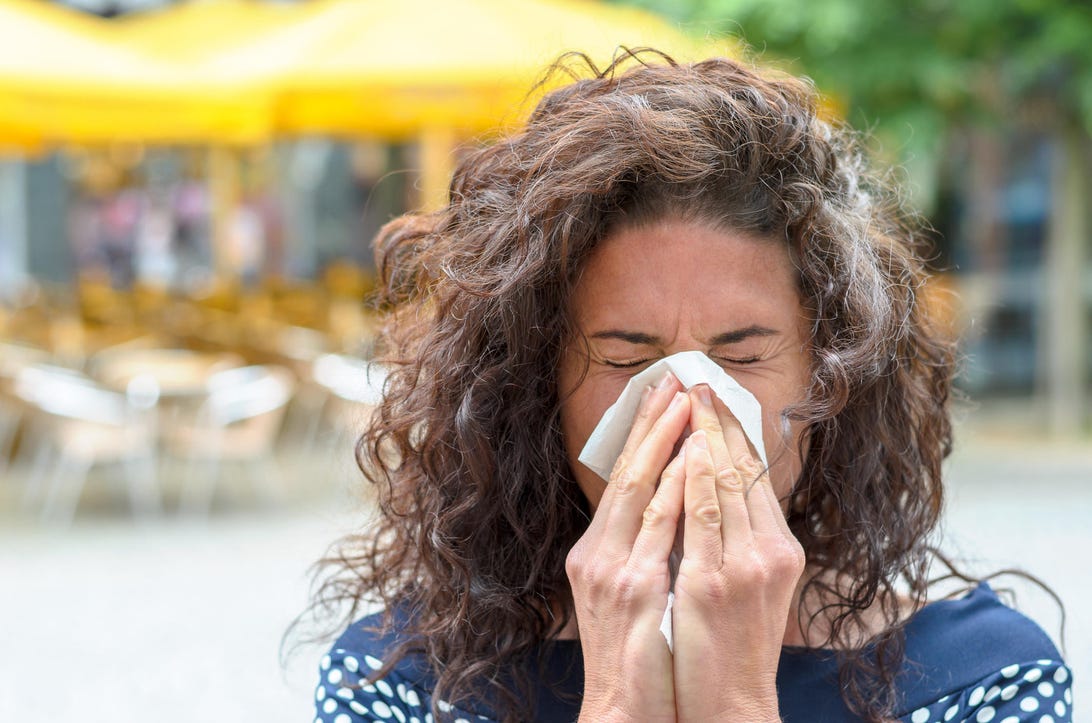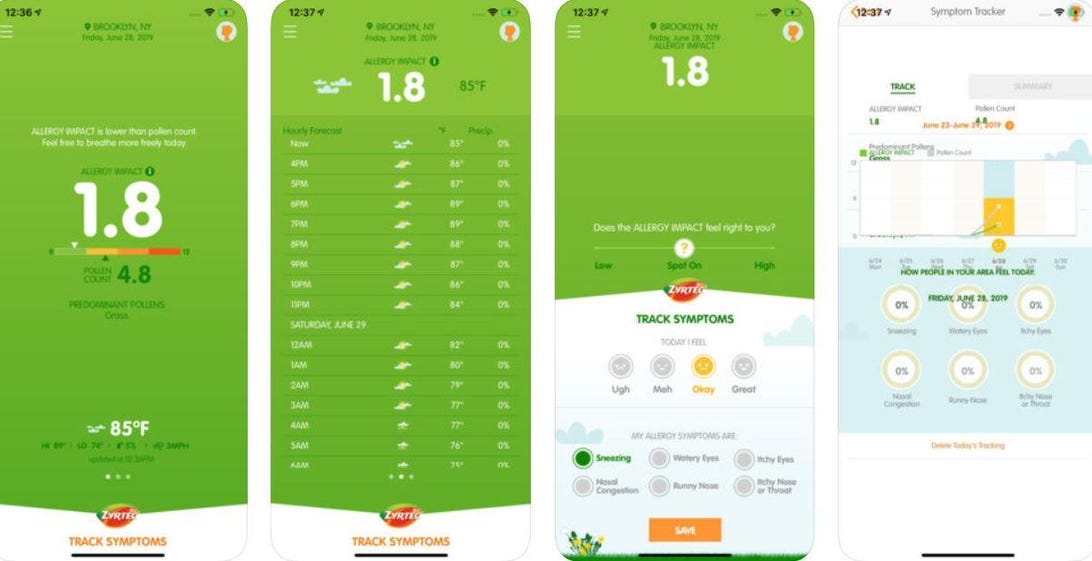How to Know if You Develop Allergies

For some people, simply the thought of being outside during spring or summer makes them want to sneeze.
Michael Heim / EyeEm / GettySome people honey jump and summertime: Blooming flowers, warm sunshine and chirping birds are a welcome arrival for many people afterwards the dark and cold winter months. For almost 8% of American adults, though, the alter of seasons spells misery.
Those 20 million people deal with allergic rhinitis, or seasonal allergies, a condition acquired when your immune organisation reacts to something in the environment. In about cases, that something is pollen from copse, grasses and weeds.
Commonly called hay fever, seasonal allergies actually have zippo to practice with hay or fevers. That misnomer comes from a long-gone era when symptoms would strike during hay harvests in late summer and early fall, before medical professionals knew what allergies were.
Recollect yous might accept seasonal allergies? See how your symptoms friction match up against these four big signs.
1. You lot've got all the typical symptoms
If you think of sneezing, wheezing and watery eyes when you call up of seasonal allergies, you lot'd be on the correct runway. There's a good chance you have seasonal allergies if yous experience whatsoever of the following symptoms:
- Frequent sneezing
- Watery or itchy eyes
- Runny nose
- Congestion in your nose, ears or chest
- Postnasal baste
- Itchy throat
- Puffy eyelids

Well-nigh seasonal allergies are caused past pollen from trees, grasses and weeds. If you have wintertime allergies, you're probably allergic to an indoor allergen like dust mites.
Marcel Holscher / EyeEm / Getty2. You have these less common symptoms
The symptoms higher up are extremely common, simply your allergies might show up in a unlike way. These less common, but even so bona fide, symptoms may indicate seasonal allergies:
- Wheezing
- Coughing
- Sudden lack of practice endurance
- Mild headache
3. Yous don't have these symptoms
Colds and allergies share many of the same symptoms, so it tin can exist tough to tell which ane yous're going through. Considering they share symptoms -- such as cough and congestion -- it's helpful to consider the symptoms that these two weather don't share.
If you lot're experiencing any of these symptoms, in that location'southward a good chance you accept a cold:
- Fatigue
- Aches and pains throughout your body
- Weakness
- Severe headache
- Sore throat (different from the itchiness caused past allergies)
Another way to tell the difference betwixt a cold and allergies is the duration of your symptoms. Colds unremarkably go away on their own in vii to x days, whereas allergies persist until they're treated or until the trigger is gone -- which can have months depending on what you are allergic to.

If you lot know you're allergic to pollen, you can try an app similar Zyrtec AllergyCast to check the pollen counts and see if it'southward a good idea (or not) to go outside.
Screenshot from App Store4. Your symptoms just show upward at certain times
If yous have seasonal allergies, your symptoms should arise and go away around the same fourth dimension each year. For nearly people, seasonal allergy symptoms begin in the spring and stop in the autumn. Yet, depending on your allergy triggers, you may experience allergic rhinitis in whatever of the four seasons. Here'southward a rundown of plants that usually crusade seasonal allergies:
Spring: Tree pollen, specially that from oak, elm, birch, cedar, willow, poplar, horse chestnut and alder copse.
Summer: Grasses, such equally ryegrass, Kentucky bluegrass, Timothy grass, Bermuda grass and more.
Fall: Pollen from weeds is the main business in the fall months. Many people are allergic to the pollen in ragweed, tumbleweed, pigweed, sagebrush, Russian thistle and more.
Winter: Most people find that their allergies become dormant during the wintertime months because most plants don't pollinate during winter. If you lot still become watery eyes and a runny olfactory organ during cold weather, you might exist allergic to indoor allergens, such as dust mites, mold or pet dander.
How to treat seasonal allergies
In nearly cases, an over-the-counter antihistamine and decongestant will exercise the play tricks. If you have severe allergies, all the same, your doctor may prescribe nasal steroid spray or allergy shots to dampen symptoms.
Information technology'due south always a good idea to effort your best to avoid your triggers, but that doesn't hateful you accept to pigsty upwards inside with a box of tissues. To get less exposure to your allergens:
- Proceed your windows shut when your allergies are active
- Apply an air purifier if you're sensitive to indoor allergens
- Wear a grit mask while doing one thousand work
- Check your local weather network for pollen forecasts
- Have a shower and wash your hair at the finish of each day to get rid of pollen that attached to your apparel, hair and pare
30 bound cleaning tricks you'll wish you'd known all forth
Run across all photosI think I take an allergy, but I'm non sure…
By and large, if you experience whatever combination of the typical symptoms -- watery eyes, runny nose, sneezing, etc. -- you can safely conclude that you're allergic to something.
If y'all don't know what that something is and you desire to discover out, your chief care physician can refer you to an allergist. Allergists behave skin or blood tests to determine what substances yous're allergic to.
The thing is, most people showroom the same symptoms regardless of the allergen, considering allergic rhinitis is a status with symptoms contained of triggers. So if your allergies aren't severe, then yous're probably OK to accept an over-the-counter allergy pill and non worry almost it. If your allergies are severe, though, y'all might benefit from an allergy test then you can actively avoid your triggers.
The data contained in this article is for educational and advisory purposes simply and is non intended as health or medical advice. Always consult a doctor or other qualified wellness provider regarding any questions yous may have about a medical condition or health objectives.
The information contained in this article is for educational and informational purposes only and is not intended as health or medical communication. Always consult a physician or other qualified health provider regarding any questions you may accept about a medical condition or wellness objectives.
dillardfeackle1983.blogspot.com
Source: https://www.cnet.com/health/signs-you-have-seasonal-allergies/
0 Response to "How to Know if You Develop Allergies"
Post a Comment